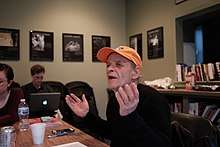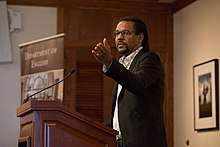Texas State University MFA
The Texas State University MFA Program at Texas State University in San Marcos, Texas, is a three-year graduate-level creative writing program in the United States. Fiction writer Doug Dorst is currently the director of the program. The faculty includes many award-winning writers.

It was cited by The New York Times as having the vision "to build a program that might rival the famed Iowa Writers' Workshop." Texas State's MFA program ranked 45th out of 131 full-residency graduate writing programs in the Poets & Writers survey for the application year 2012.[1]
As of Fall, 2018, 90% of Texas State MFA students are receiving full funding through a combination of scholarships and assistantships.[2]
MFA students staff Porter House Review, the program's new literary journal (debuted Fall 2018), which features established and emerging writing from around the world. Working for the publication allows students to gain experience as editors, work with visiting instructors from across the publishing industry, and earn up to six credit hours for their work.[3]
Faculty
- Cyrus Cassells, Poetry
- Doug Dorst, Fiction/Program Director
- Jennifer duBois, Fiction
- Tom Grimes, Fiction
- Roger Jones, Poetry
- Debra Monroe, Fiction
- Tim O'Brien, Professor of Creative Writing
- Cecily Parks, Poetry
- Kathleen Peirce, Poetry
- Steve Wilson, Poetry[4]
- Naomi Shihab Nye, Poetry
Endowed Chair in Creative Writing
Each year, the Endowed Chair in Creative Writing teaches one graduate MFA workshop. The Chair holder also visits classes and gives two readings. MFA students may take a workshop with only one Endowed Chair holder.
National Book Award Winner Tim O'Brien held the Chair every other year from 1999 through 2012. Now, as our professor of creative writing, he teaches six MFA workshops annually. Every workshop is open to every student. Previous Chair holders include the poet Ai, Barry Hannah, Denis Johnson, Robert Stone and Cristina Garcia.[5]
- Ai, 2002-2003
- Tim O'Brien, 2003-2004
- Barry Hannah, 2004-2005
- Tim O'Brien, 2005-2006
- Denis Johnson, 2006-2007
- Tim O'Brien, 2007-2008
- Li-Young Lee, 2008-2009
- Tim O'Brien, 2009-2010
- Robert Stone, 2010-2011
- Tim O'Brien, 2011-2012
- Cristina García, 2012-2014
- Ben Fountain, 2014-2016
- Karen Russell, 2016-2020[6]
- Téa Obreht, 2020-2021[7]
Adjunct Thesis Faculty
Texas State's adjunct thesis faculty is composed of nationally recognized writers who will read students' entire thesis manuscript and then send written personal comments, offering one-to-one readings of the books students write during their time in the program.
Fiction faculty:
- Rick Bass
- Kevin Brockmeier
- Maxine Chernoff
- Catherine Chung
- John Dufresne
- Fernando Flores
- Amy Hempel
- Carol Maso
- Nina McConigley
- David McGlynn
- Antonya Nelson
- Idra Novey
- Karen Olsson
- Alberto Rios
- Elissa Schappell
- Chaitali Sen
- Bennett Sims
- Natalia Sylvester
- Esme Weijun Wang
- Kevin Wilson
Poetry faculty:
- Hala Alyan
- Catherine Barnett
- Jennifer Browne
- Victoria Chang
- Jennifer Chang
- Heather Christle
- Monica de la Torre
- Natalie Diaz
- Carolyn Forche
- Laurie Ann Guerrero
- Joanna Klink
- Ada Limón
- Alessandra Lynch
- Khadijah Queen
- Spencer Reece
- Sam Sax
- Charif Shanahan
- Brian Turner
- Monica Youn
Visiting Writers Series
Since Fall 2016, Texas State's MFA Visiting Writers Series has hosted twenty esteemed writers.[8] Among the writers are 5 Pulitzer Prize winners, 5 MacArthur Geniuses, 4 National Book Award winners, 8 Guggenheim Fellows, 8 NEA Fellows, 2 LA Times Book Prizes, 1 Man Booker Prize, 7 NBCC Award Finalists, 3 PEN/Faulkner Finalists and 2 Stegner Fellows. On average, the Texas State visiting writers spend 6 hours more with the MFA students in comparison to any other MFA program around the country. The series are held on Thursdays and Fridays at the Witcliff collections and at the Katherine Anne Porter Literary Center respectively.[9] The latter is the childhood home of Pulitzer Prize and National Book Award winner Katherine Anne Porter, and in 2006, it was added to the National Register of Historic Places.
Writer-in-Residence
Every Spring, a writer in residence joins the MFA program for a series of readings, master classes, workshops, manuscript consultations, and other collaborative events.
The Spring 2019 writer in residence is Ada Limon.[10]
Clark Prize
The L.D. and LaVerne Harrell Clark Fiction Prize is a $25,000 award recognizing an exceptional recently-published book-length work of fiction. The Clarke Fiction Price is awarded annually by the Texas State University English Department.[11]
- Jim Shepard, 2017
- Colson Whitehead, 2018
- Daniel Alarcon, 2019
 Colson Whitehead gives a reading at Texas State
Colson Whitehead gives a reading at Texas State
References
- "2012 MFA Rankings: The Top Fifty". Poets & Writers. Retrieved 12 July 2020.
- "About Us : MFA in Creative Writing". Texas State University. Retrieved 12 July 2020.
- "About Us". Porter House Review. Retrieved 12 July 2020.
- http://www.english.txstate.edu/mfa/Faculty.html
- https://www.english.txstate.edu/mfa/Faculty/Endowed-Chair.html
- http://www.english.txstate.edu/mfa/Endowed-Chair.html
- Blaschke, Jayme. "Téa Obreht named Endowed Chair in Creative Writing at Texas State". Texas State University. Retrieved 4 January 2020.
- "About Our Series : MFA in Creative Writing". Texas State University. Retrieved 12 July 2020.
- "History". The Katherine Anne Porter Literary Center. Retrieved 12 July 2020.
- https://www.english.txstate.edu/mfa/Faculty.html
- "The L.D. and LaVerne Harrell Clark Fiction Prize". Texas State University. Retrieved 4 January 2020.